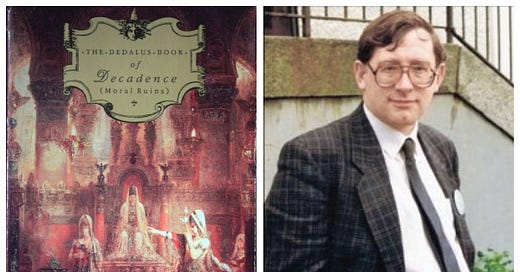An interesting anthology of writings from roughly 1880-1900 by French and British writers. 60 page introduction concludes:
....The Decadents were right, and are right, about two matters – one important and one admittedly trivial – which have not yet been universally conceded, but ought to be.
The important matter about which the Decadents were right is their opinion of the veneration of Nature. They thought that it was stupid; it was; and it is. Where they had to live with the legacy of Rousseau we have to live with a growing Ecological Mysticism which is a lethal pollutant of green politics and the parent of an indiscriminate hostility to exactly those aspects of technological progress which might yet save us from the filthy mess which we are making of the world. There is a widespread popular misconception to the effect that turning forests into deserts and rivers into sewers is the perogative of modern men armed with sophisticated technologies, and that if only technological progress could be reversed all would be well. In the ears of people who believe such nonsense there is no more euphonious word than “natural”, which has come to be a synonym for “good”.
The Decadents treated such ideas with a scorn which they thoroughly deserve. They recognised that all the triumphs of mankind are based in artifice, and that the principal condition of the success of human life is a secure and complete control of nature. The Decadents would have condemned as shallow fools those critics who find something perverse and unnatural in the notion of taking control of genetic processes so that we may become true governors of creation, and they would have been right to do so. The Decadents might have remained pessimistic about the actual project of deploying sophisticated techniques of genetic engineering in time to save the world from ruin, but they would have had no doubts about its propriety. If one can speak at all about a Decadent Ideal World (and one has to admit that there is a certain paradox in the notion) then that Ideal World would be a world in which people had total control over all matters of biology, including their own anatomy, physiology and physical desires; it is an Ideal which we can and ought to share, though far too few of us actually do.
The trivial matter about which the Decadents were right, although this point might arguably be reckoned as a mere corollary of the first, concerns their cynical attitude to matters of sexual morality – and, indeed, their dismissal of the ambitions of all prescriptive systems of morality. They were right-but not particularly original – when they argued that no set of rules could ever succeed in dampending the perverse curiosity of the human mind; they were right, too, to be severely sceptical as to whether that acknowledged impossibility is altogether to be regretted. The mythology of ideal romantic love which is peddled in today’s world is not much different from that which was peddled in the 1880s, and there are probably no more people who think that actual contemporary relationships are accurately reflected in that mythology than there were then; that is not surprising. What is surprising is there are probably as many people, or more, who think that the world would be a far better place if the real world were more like the mythological world of romantic fiction. A healthy dose of Decadent fiction may still be capable of curing victims of that particular delusion, and ought at least to be tried.
Even the Decadents, it must be confessed, did have a tendency to regret the non-existence of Ideal Love, but their sense of tragedy was outside the common rut. They shed their fair share of tears over the fact that real people have to make do with lesser affections, which must of necessity be granted to relatively undeserving recipients. But they were also prepared to take an experimental attitude to the problem by suggesting that if the mythology turned out to be an abject failure (as it inevitably would) perhaps it might be stretched and twisted into a better shape by trial and error....
The Dedalus Book of Decadence (Moral Ruins) Edited by Brian Stableford (1990)



